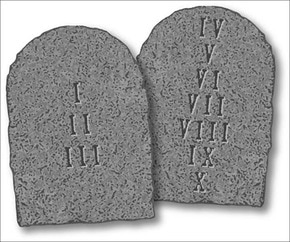 The ten commandments are often used to sketch out the parameters for Christian morality. But they seem to me to be secondarily about morality and more a statement about God and his relation to his creation. Wikipedia has a great chart on the various numbering traditions of the ten commandments (numbering them is not as straightforward as it would seem). The medieval Christian tradition divided the commandments into two tables. The first three (or four) on the first and the rest on the second. The division makes sense on the face of it. The second table is a set of clear moral and negatively phrased moral prescriptions, "thou shalt not." These have to do with one's relations to those in one's community. The first table, on the other hand, focus on God. Then there's the fourth, which no one's quite sure where to place. Honoring father and mother would seem to be an easy fit for the second table, but there is something about honoring father and mother that seems to stand in proxy for honoring God. (First Table)
(Second Table) 4. Honor thy father and thy mother. 5. Thou shalt not kill. 6. Thou shalt not commit adultery. 7. Thou shalt not steal. 8. Thou shalt not bear false witness against thy neighbor. 9. Thou shalt not covet thy neighbor's wife 10. Thou shalt not covet thy neighbor's house, servants, animals, or anything else Now, there is one approach to the ten commandments that would say that these commandments reflect a moral goodness inherent in existence and not even God would/could contradict them. Not that he would want to but that it would be contradictory to his nature. So it is always eternally wrong to steal or to murder or to commit adultery, just as it is always eternal wrong to have another god instead of God. Another approach, represented by a medieval, John Duns Scotus, says that while the first table of the commandments reflect prescriptions that are inherent to existence, the second doesn't. So God cannot truthfully say to not worship him or to take his name in vain. However, there is a world or an arrangement of things in which God could will that adultery is acceptable (of course then, it may not be called adultery). In this case, rightness and goodness are determined by God's will as opposed to the first case where rightness and goodness are established by God's nature. With parallel worlds then, you can maintain a system of the Christian God with a moral system markedly different than we have in ours. The key would be that the first table of the law can't be violated and the other commandments have to be in harmony with them.
0 Comments
Leave a Reply. |
AuthorOno Ekeh Archives
June 2020
Categories
All
|
 RSS Feed
RSS Feed

